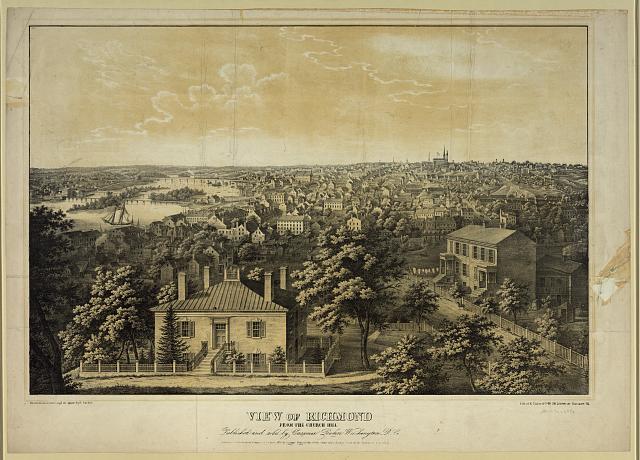Just like old times – white surgeons received their degrees at a black church led by a white, slave-owning minister. But I can understand how the writer would find this ceremony, with Richmond belles checking out the new doctors, comforting after two years of war. Of course, the war was always there – it meant a big demand for the surgeons’ skill.
From the Richmond Daily Dispatch March 7 1863:
Medical College Commencement.
–The African Church was densely thronged last night by the “beauty and fashion” of the city, in consequence of the announcement, that the annual commencement exercises of the Medical College were to take place. It was a scene that forcibly reminded the spectator of “Richmond in by-gone days.” After an impressive prayer by Rev. Dr. Moore, the address to the graduating class was delivered by Professor Wellford, and listened to with deep attention. The ceremony of conferring degrees upon the band of young doctors was, as usual, the most interesting feature of the occasion to the ladies present. The band played lively airs at intervals, and everything went off to the satisfaction of all concerned.
Today’s VCU Medical Center traces its founding to 1838. It became a state institution in 1860.
Soon the Civil War erupted, and the College found itself playing an important role in the education of Confederate surgeons and in the hospital care of wounded and sick military personnel. During the Civil War, the school remained open and it graduated a class every year throughout the conflict. The MCV is the only Southern medical school still in existence to have done so. [1]
Richmond’s First African Baptist Church was founded in 1841 when white members of the original congregation established a separate church and sold the original building to the Africans.
As one of the largest meeting halls in Richmond, it was often rented for white events. Its large interior and prominent location in Richmond made it a sought after venue for events such as concerts and political rallies. The practice of renting the church was controversial among members due to the use of a church for secular events and due to the racial segregation often imposed at the events. The practice continued, however, due in part to the significant income that it provided.
John Hartwell Cocke lectured on temperance at at one of the earliest major events hosted at the church. While the government of the Confederate States of America was based in Richmond during the American Civil War, the church was often used for speeches by politicians including Governor William Smith and President Jefferson Davis. Judah Benjamin also spoke at the church to recruit blacks into the Confederate Army. …
Though it was always a Black church, it was initially led by a white minister and a board of thirty black deacons because it was illegal for blacks to preach. … The first senior minister, Robert Ryland, served from 1841 until 1865. Ryland owned slaves and believed that slavery was the best way to convert Africans to Christianity. … [2]
- [1] Wikipedia references to Hoke, Thelma (1963). The First 125 Years of the Medical College of Virginia.↩
- [2]Wikipedia references to Leveen, Lois (24 January 2011). “The North of the South” New York Times; Kimball, Gregg (2000), American City, Southern Place: A Cultural History of Antebellum Richmond, Athens, Georgia: University of Georgia Press; Furgurson, Ernest (1996), Ashes of Glory: Richmond at War (2 ed.), New York: Vintage Books↩

